Many guinea pig owners enjoy offering their pets natural snacks like fruits and vegetables. However, when it comes to yard plants like clover, it’s important to consider whether it’s safe for your furry friend to consume. In this article, we will delve into the potential benefits and risks of allowing guinea pigs to eat clover from the yard.
Key Takeaways:
- Guinea pigs have specific dietary requirements that must be met for their overall health and well-being.
- Clover is a nutritious plant with potential benefits for guinea pigs, but it’s essential to monitor for overconsumption and contamination.
- There are alternative, safe options to consider if you’re hesitant to offer yard clover.
- Always consult with a veterinarian before introducing any new foods to your guinea pig’s diet.
- Pay attention to any signs of overconsumption or toxicity and take appropriate actions to ensure your pet’s health and well-being.
Understanding Guinea Pig Diet
Guinea pigs have unique dietary needs that require careful consideration to ensure their overall health and well-being. A healthy diet for guinea pigs should consist of fresh hay, which serves as a source of fiber. Guinea pigs also require fresh vegetables, such as carrots, kale, bell peppers, and leafy greens, which are rich in vitamins and minerals. Additionally, providing a small amount of fresh fruits, such as apples and strawberries, can be beneficial.
It is essential to avoid feeding guinea pigs foods that are high in sugar, fat, or salt. These foods can lead to obesity, tooth decay, and other health problems. Some common examples of foods to avoid include candy, chocolate, potato chips, and processed snacks.
Tip: Always provide fresh, clean water to your guinea pig. Make sure to change the water daily and avoid using water that has been sitting in plastic containers for too long, as this can lead to bacterial growth.
Protein Requirements
In addition to fiber, vitamins, and minerals, guinea pigs also require adequate protein in their diet. A diet that is too low in protein can lead to muscle weakness and other health problems.
One source of protein for guinea pigs is high-quality pellet food, which should make up no more than 5% of their overall diet. It is important to choose pellets that are specifically formulated for guinea pigs, as other types of pellets may not meet their nutritional needs.
Guinea pigs can also obtain protein from other sources, such as fresh leafy greens, alfalfa hay, and small amounts of seeds and nuts. However, it is important not to rely too heavily on these foods as they can be high in fat or calcium, which can lead to health problems.
Vitamin C Requirements
Like humans, guinea pigs cannot produce their own vitamin C and must obtain it from their diet. A lack of vitamin C can lead to scurvy, a serious health condition that can cause symptoms such as lethargy, loss of appetite, and swollen joints.
Guinea pigs should consume at least 10-30 mg of vitamin C daily, depending on their size and weight. Vitamin C can be obtained from fresh vegetables and fruits, such as peppers, kale, broccoli, and oranges.
The Nutritional Value of Clover
Clover is a common plant that can be found in many yards and fields. This green leafy plant is known for its nutritional content and potential benefits for guinea pigs.
First and foremost, clover is a good source of vitamin C, an essential nutrient for guinea pigs that they can’t produce on their own. In fact, a single cup of clover can provide up to 32% of a guinea pig’s recommended daily intake of vitamin C. Clover also contains vitamin K, which can help with blood clotting, and vitamin A, which can support their immune system and eye health.
Aside from vitamins, clover is also rich in minerals like calcium, phosphorus, and potassium. These minerals are important for maintaining healthy bones, muscles, and overall bodily functions in guinea pigs.
Types of Clover
There are several types of clover that can be found in yards and fields. The most common varieties are white clover, red clover, and crimson clover. While they may differ slightly in nutritional content, all types of clover can provide potential benefits for guinea pigs.
It is important to note that excessive consumption of clover can lead to digestive issues in guinea pigs. Introduce clover slowly and in moderation, and monitor your pet for any signs of discomfort or digestive problems. Consult with a veterinarian for personalized advice on incorporating clover into your guinea pig’s diet.
Safe Snacks for Guinea Pigs
Keeping your guinea pig healthy and happy involves offering them a balanced diet, which includes some tasty treats. However, not all foods are safe for guinea pigs, so it’s crucial to consider their nutritional needs and food sensitivities before introducing new snacks.
Common Safe Snacks for Guinea Pigs:
- Fruits: apples, bananas, strawberries, blueberries, raspberries
- Veggies: carrots, cucumbers, bell peppers, tomatoes, celery
- Herbs: parsley, cilantro, dill, basil
When selecting treats for your guinea pig, it’s essential to avoid high sugar or high-fat foods, as these can lead to digestive issues and obesity. Additionally, make sure to clean all fruits and vegetables thoroughly and remove any seeds or pits that could be a choking hazard.
Remember that snacks are meant to supplement, not replace, your guinea pig’s regular diet, and they should be offered in moderation. Consult with a veterinarian if you’re unsure about whether a particular snack is safe for your pet.
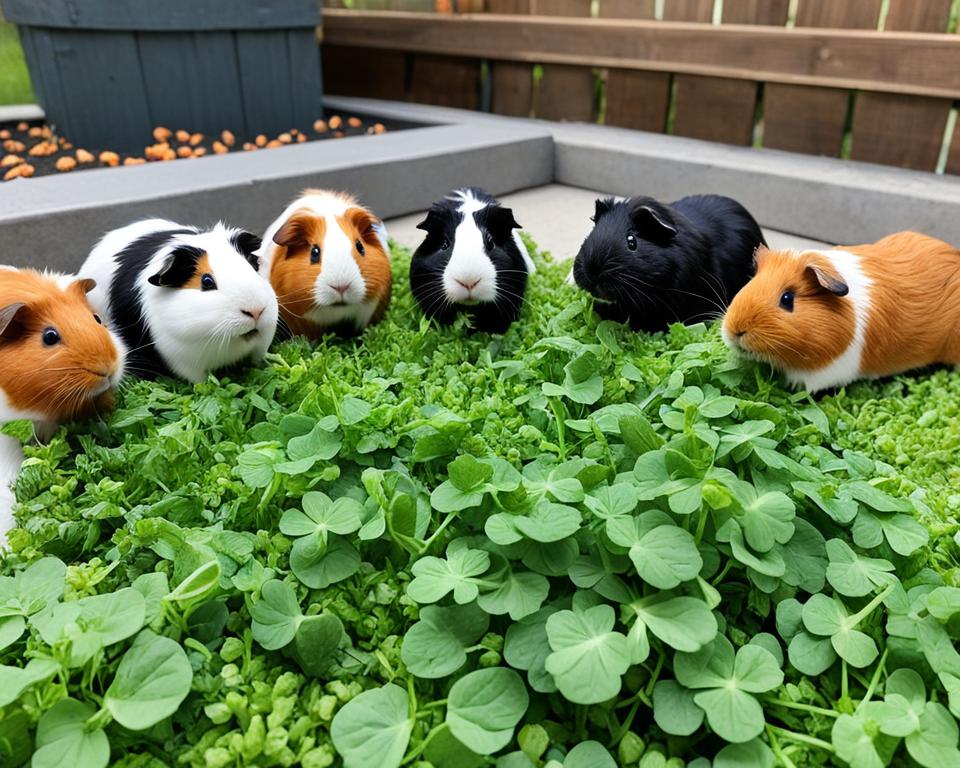
Yard Clover: Potential Benefits
Yard clover is not just a tasty treat, it can also provide several benefits for your guinea pig’s health.
Digestive System
Clover contains fiber and other nutrients that can aid in digestion. It helps to keep your guinea pig’s digestive system healthy and functioning properly.
Dental Health
Chewing on yard clover can also help to promote dental health in guinea pigs. It helps to wear down their constantly-growing teeth and keeps them from becoming too long.
Overall Well-being
Additionally, yard clover contains several essential vitamins and minerals that can contribute to your guinea pig’s overall health and well-being.
Incorporating yard clover into your guinea pig’s diet can provide numerous benefits, but as with any new food, it is important to introduce it gradually and in moderation.
Potential Risks of Yard Clover
While yard clover can be a nutritious snack for guinea pigs, it’s crucial to be aware of the potential risks that come with it. Consuming excessive amounts of clover or contaminated plants can be harmful to your furry friend’s health.
One of the main risks of overfeeding clover is bloating, which can be uncomfortable and even life-threatening for guinea pigs. Clover is high in fiber and can cause gas build-up in their digestive tract if consumed in large amounts.
Additionally, clover that has been contaminated with pesticides or chemicals can be toxic to guinea pigs. It’s best to avoid feeding your pet clover from areas that may have been treated with harmful substances.
Another risk of feeding yard clover is introducing harmful parasites or bacteria into your guinea pig’s system, which can cause illness. Always ensure that the clover you offer your pet is clean and free from any potential harmful contaminants.
The Bottom Line
While yard clover can be a nutritious addition to your guinea pig’s diet, it’s important to offer it in moderation and avoid any potential risks. Make sure the plants are clean and free from contamination before feeding them to your pet, and always monitor their health for any signs of overconsumption or toxicity. By taking these precautions, you can safely introduce yard clover as a healthy snack option for your beloved guinea pig.
How to Safely Introduce Yard Clover
If you are considering introducing yard clover to your guinea pig’s diet, it is essential to do so safely.
- Start Slow: Begin by offering a small amount of yard clover alongside your guinea pig’s regular food. Gradually increase the amount over time, observing any changes in their behavior or health.
- Choose Fresh Clover: Only offer fresh clover that has not been sprayed with pesticides or other chemicals. Wash the leaves thoroughly to remove any dirt or potential contaminants.
- Avoid Overconsumption: While clover can be a healthy snack, too much of it can lead to digestive problems and other health issues. Limit their intake to a few leaves per day.
- Monitor Your Guinea Pig’s Health: Keep a close eye on your guinea pig after introducing yard clover to their diet. Look for any signs of overconsumption, such as diarrhea or vomiting. If you notice any unusual symptoms, consult with your veterinarian.
Overall, introducing yard clover to your guinea pig can be a safe and nutritious addition to their diet if done correctly. Remember to prioritize their health and well-being by following these guidelines.
Other Yard Plants to Avoid
While yard clover may be safe for guinea pigs, there are certain yard plants that can pose significant dangers to your pet’s health.
Avoid These Common Yard Plants
- Azaleas and Rhododendrons: These plants contain toxins that can cause digestive upset, weakness, and even coma or death.
- Daffodils: The bulbs of these flowers contain lycorine, which can cause vomiting, drooling, abdominal pain, and even heart problems.
- Iris: The root of this plant contains toxins that can cause vomiting, diarrhea, and skin irritation.
- Lilies: These plants are highly toxic to guinea pigs and can cause fatal kidney failure even in small amounts.
- Tomato Plants: The leaves and stems of tomato plants contain solanine, a toxin that can cause gastric upset, weakness, and even heart problems.
It is crucial to ensure that your guinea pig does not have access to any of these plants. If you suspect that your pet may have ingested any of these toxic plants, seek veterinary care immediately.
Signs of Clover Overconsumption or Toxicity
While clover can provide several health benefits to guinea pigs, it is essential to monitor their consumption and ensure they do not suffer from overconsumption or toxicity. Some common signs to look out for include:
- Diarrhea
- Lethargy
- Loss of appetite
- Difficulty breathing
- Jaundice
- Vomiting
- Abdominal pain
If you notice any of these symptoms, it is important to take immediate action to prevent your guinea pig from suffering further harm. You should stop offering clover and other foods and provide only hay and fresh water for at least 24 hours. If your guinea pig’s condition does not improve or worsens, seek veterinary advice.
Alternatives to Yard Clover
If you’re looking for alternatives to yard clover, there are several safe and healthy options that can provide similar nutritional benefits for your guinea pig.
1. Romaine Lettuce
Romaine lettuce is a good source of vitamin C and can make a tasty addition to your guinea pig’s diet. Just be sure to wash it thoroughly to remove any pesticides or contaminants.
2. Carrots
Carrots are another great source of vitamin C and can help promote healthy teeth for your guinea pig. Cut them into small pieces to prevent choking and feed them in moderation to avoid overconsumption.
3. Bell Peppers
Bell peppers are a colorful and flavorful addition to your guinea pig’s diet. They are high in vitamin C and other essential nutrients that can benefit your pet’s health.

Remember to always introduce new foods slowly, in small quantities, and monitor your guinea pig’s health for any signs of overconsumption or negative reactions. Consult with a veterinarian for personalized advice on the best diet for your pet.
Consult a Veterinarian
Guinea pigs have unique dietary needs, and it is essential to ensure they receive adequate nutrition for their overall health and well-being. Before introducing new foods like yard clover, it is crucial to consult with a veterinarian. A veterinarian specializing in small animals can provide personalized advice on your guinea pig’s dietary requirements and recommend safe and nutritious snacks for your pet.
If you notice any changes in your guinea pig’s behavior or appetite after introducing yard clover or any new food, seek veterinary care immediately. Signs of overconsumption or toxicity can include lack of appetite, diarrhea, lethargy, or difficulty breathing. Your veterinarian can perform a thorough evaluation and suggest appropriate treatment if necessary.
Conclusion
In conclusion, it is clear that yard clover can be a safe and nutritious snack for guinea pigs if offered with caution. It is crucial to understand their specific dietary requirements and consult with a veterinarian before introducing any new foods. While yard clover can provide several potential benefits, such as aiding in digestion and improving dental health, there are also potential risks involved. It is essential to monitor your guinea pig’s health for signs of overconsumption or toxicity and be mindful of other yard plants that may pose hazards to these small pets.
Remember to introduce yard clover gradually and in moderation, ensuring that it is free from pesticides and contaminants. If you are unsure about the safety of yard clover or any other foods, there are alternative options available that can provide similar nutritional benefits. Consult with a veterinarian for personalized advice and recommendations on your guinea pig’s diet.
Overall, the well-being of your guinea pig should always be top priority when considering their dietary options. With proper care and attention, yard clover can be a safe and enjoyable addition to their diet.
FAQ
Is yard clover safe for guinea pigs to eat?
Yes, yard clover can be a safe snack for guinea pigs. However, it is important to ensure that the clover is free from pesticides or other harmful chemicals.
What are the dietary needs of guinea pigs?
Guinea pigs have specific nutritional requirements. Their diet should consist of high-quality hay, fresh vegetables, pellets, and access to clean water at all times.
What is the nutritional value of clover?
Clover is rich in vitamins and minerals such as vitamin C, vitamin K, calcium, and magnesium. It can contribute to the overall nutrition of guinea pigs when offered in moderation.
What are some safe snacks for guinea pigs?
Some safe snacks for guinea pigs include carrots, bell peppers, cucumbers, and leafy greens such as spinach and kale. These snacks should be introduced gradually and in small quantities.
What are the potential benefits of yard clover for guinea pigs?
Yard clover can have positive effects on the digestive system of guinea pigs, promote dental health, and contribute to their overall well-being. It can also provide them with additional nutrients.
Are there any risks associated with consuming yard clover?
While yard clover can be a nutritious snack, it should be offered in moderation. Excessive consumption or contaminated plants can lead to digestive issues or other potential risks for guinea pigs.
How can I safely introduce yard clover to my guinea pig’s diet?
To safely introduce yard clover, start with small amounts and gradually increase the portion size. Monitor your guinea pig for any adverse reactions and consult a veterinarian if necessary.
Are there any other yard plants to avoid for guinea pigs?
Yes, there are several yard plants that can be toxic to guinea pigs. Some common ones include daffodils, tulips, lilies, and ivy. It is important to ensure a safe environment for your pet.
What are the signs of clover overconsumption or toxicity in guinea pigs?
Signs of clover overconsumption or potential toxicity may include diarrhea, decreased appetite, lethargy, or abnormal behavior. If you notice any of these symptoms, seek veterinary advice immediately.
What are some alternatives to yard clover for guinea pigs?
If you prefer not to offer yard clover, some safe alternatives for guinea pigs include parsley, cilantro, basil, and dandelion greens. These options can provide similar nutritional benefits.
Should I consult a veterinarian before introducing yard clover to my guinea pig?
Yes, it is always a good idea to consult with a veterinarian when making changes to your guinea pig’s diet. They can provide personalized advice and ensure the health and well-being of your pet.

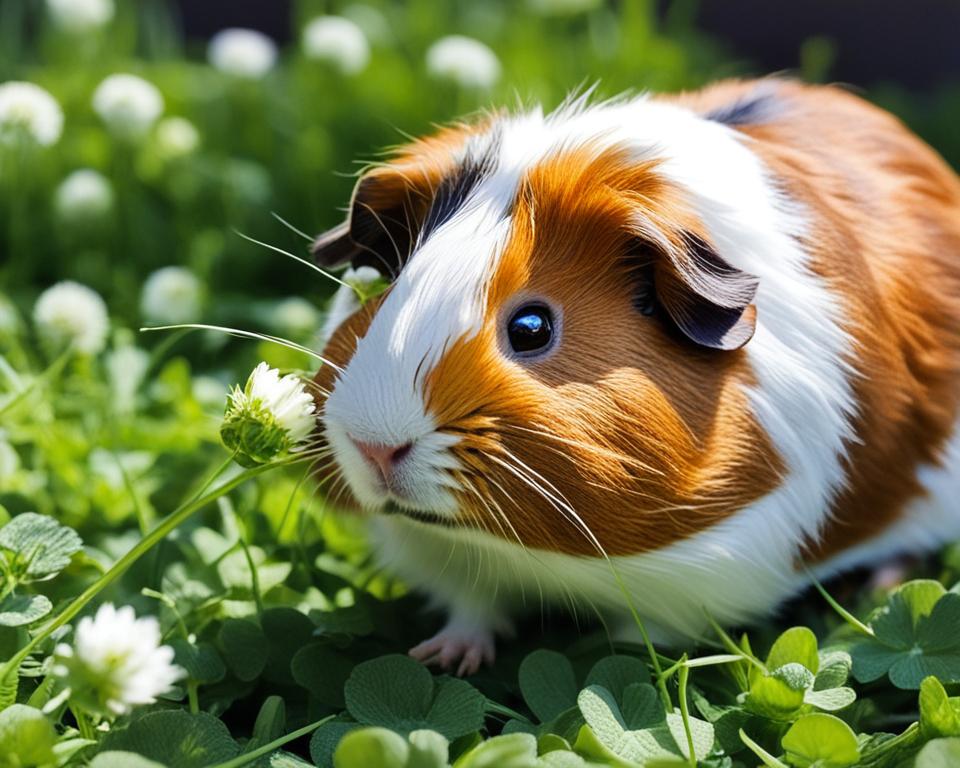
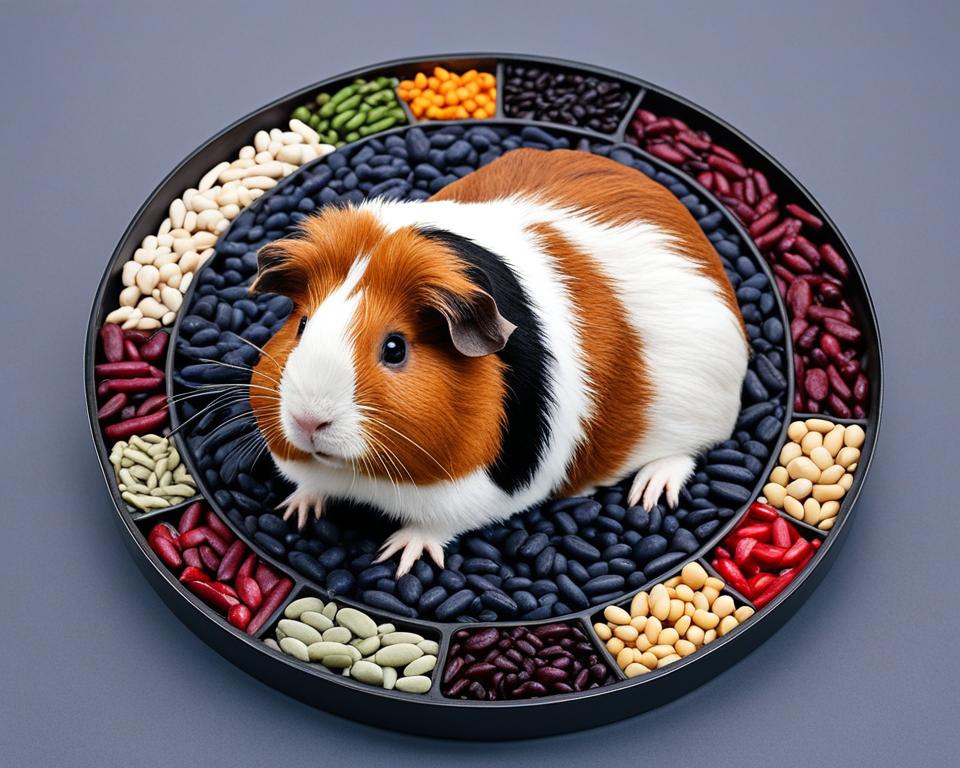
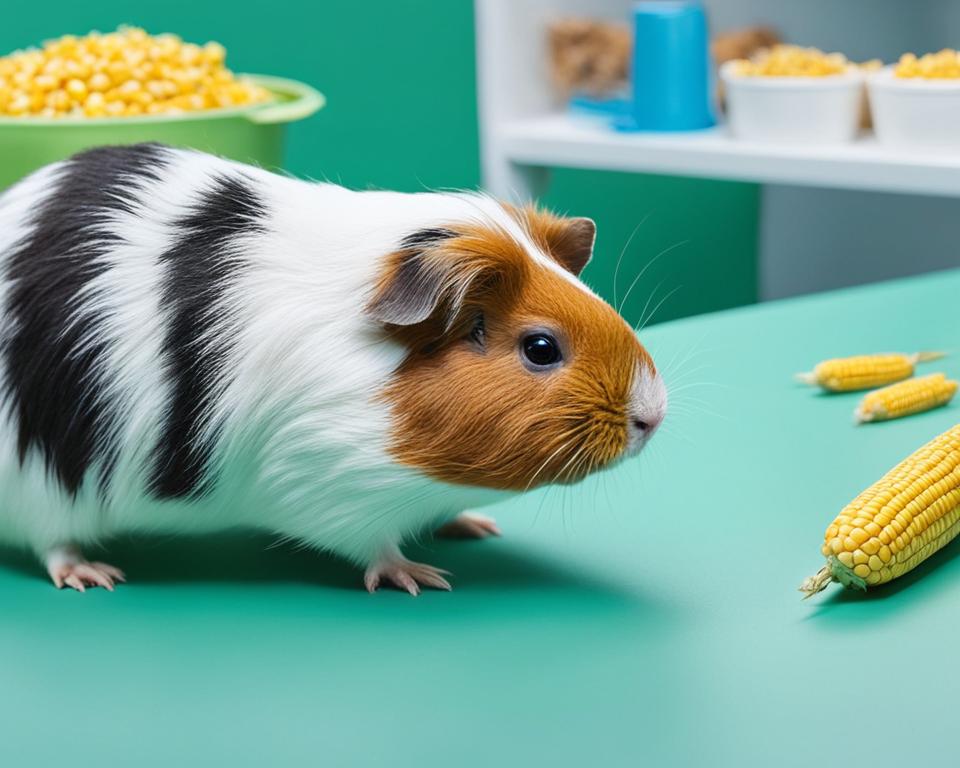
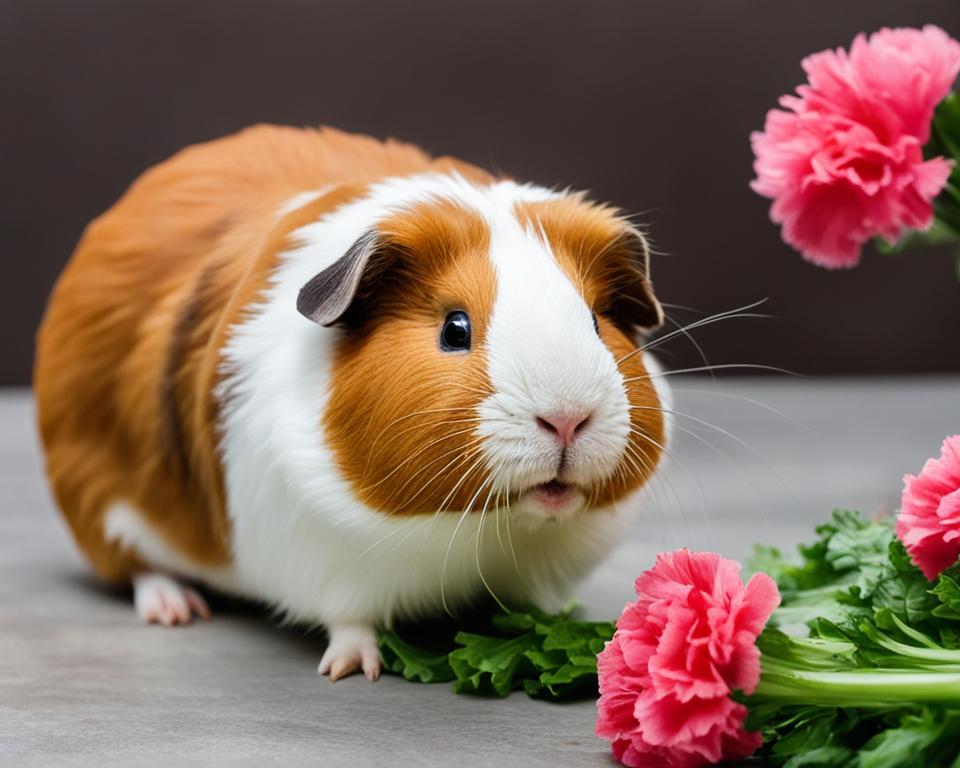
Leave a Reply